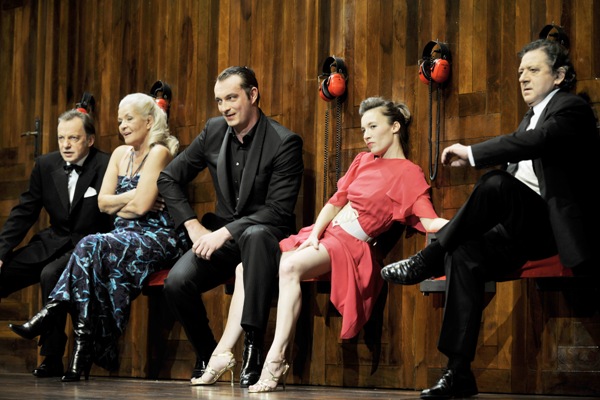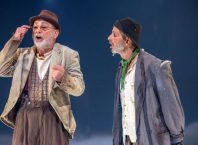
The Cameri Theatre in cooperation with the Goethe Institute and the Embassy of the Federal Republic of Germany will be hosting the Munich Kammerspiele production of Rechnitz – Angel of Death (Der Würgeengel), by Nobel Laureate Elfriede Jelinek, directed by Yossi Weiler, from February 12 – 14, 2011. The play will be performed in German with Hebrew surtitles translated by Hanan Elstein.
Jelinek’s play (for which she won the Mülheim Playwright Award 2009) refers to the events of the night of 25 March 1945, when SS officers, Gestapo commanders and local Nazi followers were celebrating at Rechnitz Castle, near the Austrian-Hungarian border. As part of the festivities, 180 Hungarian-Jewish forced labourers were murdered by the party guests. Several of the guests were given guns and over the course of the evening, the duration of three hours, the Jews were beaten to death or shot.
In anticipation of the performance, German Ambassador to Israel, Dr. Harald Kinderman met with the media to present his perspective on the play and its relevance to contemporary audiences and specifically, Israeli-German relations. Dr. Kinderman said that although the story “is a well known story, but well, it’s under-covered because the people don’t want to speak about it. Now it’s too late to bring the truth.” He explained that in her play Jelinek is not documenting the event, but rather exploring the question of how people could commit the horrors that took place in the Holocaust.
Dr. Kinderman discussed the topic from a personal point of view, saying, “Our German weekly Der Speigel published a story last week which was new for me. There are, you know, the ‘Death Marches’ when the victims were forced to march, sometimes hundreds of kilometers, to the center of Germany. This is known fact. In Yad Vashem you see a very impressive part of it and the pictures – that of course all the small villages were marched through, and the people were looking on them [the Jews], but the full truth was not like this. It was more or less uncovered up to now that thousands of Jews murdered by the civilians. This was unknown to me, and I think I’m very familiar with the history of the Holocaust, but it happened all the time. When they marched and entered a village the people were not only not giving them help or assistance, they were not only looking on them but they really actively killed them.”
“This [Jelinek’s play] is the story of this too, that so close to the end of the Nazi terror, the Red Army which liberated Europe were so close to this place [Rechnitz] that they [the guests at Rechnitz Castle] really killed so many Jews – and to be honest nobody understands why. There is no real understanding. Was it Anti-Semitism? But I think it was more, it was not rational, in a sense rational is not the proper word, but it was an outburst of violence. Jelinik is not giving an explanation and it is a sign for us to think of the definitely not-understandable of the Shoah. There are some parts you cannot understand. You cannot understand, you cannot follow it, and therefore it brings us always back to the situation of a shock… to think new of it again and again and again. Maybe not finding an answer – but again – ask questions again and again, this is what is an important part. There is always a risk of memory that it becomes a routine.”
“Living in Israel I see a huge difference between the kind of memory in Israel and in Germany. And if I read a text I immediately know if it’s from Germany or if it’s from Israel. They are different. Normally in Germany the texts are more exaggerated – unbelievable cruelty…always takes stronger, stronger, stronger words. In Israel it’s a little different for a simple reason – it’s much closer to the country and the people. This is by my very personal assessment. You’d say ‘oh, this is a terrible story which happened to this guy on the street’ – but if it happened to your mother or yourself – it’s different. And therefore sometimes I’m not so happy over this kind of memory in Germany, which in my idea sometimes it brings us too far away. Something which happened we cannot understand. It is not there, it’s missing the part that these were normal people, family people and that we should not be so safe that it is so far away – there is missing this pain. It’s not enough to have a shock but to understand it and always to ask again and again and to deal with it, and it must be disturbing.”
“Like modern art – modern art, if good, it’s best disturbing and sometimes there are memory ceremonies in Germany which are not disturbing. This [play] is disturbing and even if you are not happy with this kind of art, you are not happy with this artist’s performance, there is a resistance: why this? Why? But this kind of resistance is important because it brings it really to your own person, it brings it to your own feelings and there is not the very simple – to sit and say ‘how terrible how terrible it should not come again’ – it’s involving much more because it’s touching your feelings, and mixed feelings, which is very important. This is important to deal with the story of the Holocaust, of the Shoah, because this is not finished. It will never finish because it changed the world.”
Dr. Kinderman situated the presentation of this play, and other cultural events in the context of diplomatic relations between the two countries saying, “In a democracy you can only have good relations to another country if the people agree to it. The times of the old emperor when the emperor decides ‘this is my friend no, this is my enemy, now we have war now we have friendship’ are over. Diplomacy and foreign policy to have really a chance of success need, in a democracy, that the people agree to the issue. Because in a democracy if you do not agree to a political agenda – well – this is put off the political agenda. This is very simple, this is what democracy means.”
Dr. Kinderman further elaborated on the role of culture in foreign policy saying, “I think any kind of politics can only work if there are relations and relation is that people are interested in each other and this kind of interest, this kind of being a family or being close to the other cannot be produced by foreign policy, it cannot be produced by politics, it can only be produced by visits – which are important to see the other – and especially by culture and by art. This is the best way to produce this kind of relation and therefore what is happening here [referring to Jelinek’s play and other cultural activities sponsored by the Goethe Institute and the German Embassy] is so important for us from the a political point.”
A lawyer by profession, Dr. Kinderman shared a statement made by a judge in the German supreme court that “democracy and the rule of law are using bridges which they cannot build by themselves” drawing a parallel to the work of diplomacy saying, “This is what we experience in foreign policy and what we at the embassy are doing, we are using bridges which we cannot produce by ourselves but if I, maybe in 2 or 3 weeks I will meet somebody who has visited in the Cameri Theatre this piece [Rechnitz], my political work is much easier and will be much better than if I meet someone who has not been there.”
Returning to the significance of the Holocaust in terms of the relations between Israel and Germany, Dr. Kinderman said, “Therefore the Shoah has importance for us, and it’s important for the Israelis. And it is never the same between those who were victims and second or third generation from the victims, and those who were the perpetrators and second or third generation. It is never the same, but yet we can find here understanding, which is also fundamental for politics. It’s easier if we have productions like this, by this we can find this being together…Germany and Israel have a lot of things [in common] an important link which will never disappear is the Shoah.”
“Therefore dealing with the Shoah is of the most importance in our relations and we must deal with it in a new way. We must leave the old tracks. We must do it in a way which attracts the youngsters; we must find new forms – but this we cannot do by speeches. I can go to places and make a speech, I do this in Yad Vashem a lot of times. It is also important, but this alone is not enough. It is definitely not enough. This is a political project, not for a simple kind of politics, but it is a political project between our two countries. Personally, Israel has changed my view of foreign policy [prior to his assignment in Israel, Dr. Kinderman served as German Ambassdor to Saudi Arabia from 1999 to 2003, and to Bulgaria from 2003 to 2006]. What I have experienced in Israel has absolutely turned my personal view of my job.”






Comments are closed.